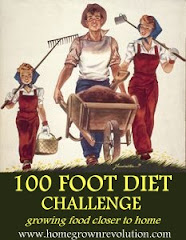
“To live content with small means; to seek elegance rather than luxury, and refinement rather than fashion; to be worthy, not respectable, and wealthy, not rich; to study hard, think quietly, talk gently, act frankly; to listen to the stars and birds, to babes and sages, with open heart; to bear on cheerfully, do all bravely, awaiting occasions, worry never; in a word, to, like the spiritual, unbidden and unconscious, grow up through the common.” ~ William Henry Channing
Monday, December 8, 2008
The Order of Things

I wrote a few posts back about creating order inside our new home, adjusting to a smaller space and less belongings. After the work of decluttering and tidying is done it feels so wonderful to stretch out and enjoy our home.
A few days ago we butchered a goat. We have created a little farm life here, an extension of what we began at our old home. On a farm there is a never-ending cycle of fecundity and sparsity. In the spring the garden wakes up and begins to grow after the winter pause. The animals bear young; dozen of eggs from the chickens, one or two kids from each female goat. The summer heat and long days full of sun help the garden to produce an astonishing amount of food in just a few months. The tiny chicks and frisky kids also grow with amazing speed. A chicken eats its way to butchering size in just twelve weeks. By the time autumn blows in, the garden has filled the root cellar, freezer and pantry with pounds and bushels and quarts. Also in the autumn the chicken coop feels much too crowded. Roosters loudly compete for attention and require substantially larger amounts of corn and scraps than they did as chicks. Some of the goat kids were male, or simply number too many to feed economically. As the light and warmth wane and the chores of the garden are fewer, butchering time comes.
Just as our home feels roomier and calmer after removing the excess, the chicken coop is quieter and much, much more peaceful after the majority of the young roosters and older hens have been, with enormous gratitude, dispatched to the freezer and pantry. It is much the same with the goats. As the male goats become mature they become aggressive and hard to manage safely. To allow peace to return to the goat pasture, leaving the does to chew their cud and fatten up until they give birth in the spring, we butcher the extra animals after they have done their job of ensuring that another generation will be born. The winter months stretch ahead of all of us, animals and humans, a quiet, less active time. The garden is scrubbed clean by the cold wind and frost while the animals enjoy the warmth of their shelters. In the snug house we plan next year's garden and cook from our stores.
Really, extra is not the right word for the animals we butcher and vegetables we eat during these dark, cold days. Unlike the material excess we gathered for years and then removed from our home, those creatures weren't brought into the world without thought. On the contrary, we put great consideration into just how much food our family requires for each turn of seasons. Each spring we plant what we hope is the just enough seeds and plan to raise just enough meat. We try to raise just enough, not too much, not too little.
I do believe the world could use a lot more just enough right now.
Subscribe to:
Post Comments (Atom)
.jpeg)














2 comments:
"I do believe the world could use a lot more just enough right now."
Amen! I'm feeling the same thing.
THIS is a well-put post. I have gone through times when slaughter was tough for me, but it still seems preferable to the styrofoam alternative, so we do it.
I had a student worker from Romania, and she said "does it seem to you that American students don't know how to live? It's like they don't know what's real and what isn't."
I said, "It's because they've never butchered a sheep."
"EXACTLY!"
Post a Comment